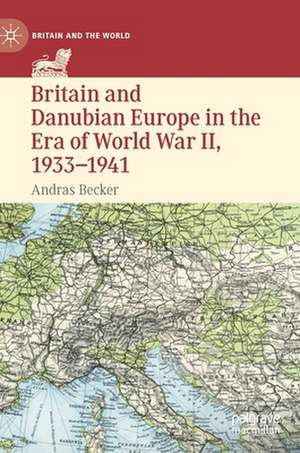Britain and Danubian Europe in the Era of World War II, 1933-1941: Britain and the World
Autor Andras Becker Cuvânt înainte de R. J. W. Evansen Limba Engleză Hardback – 25 mar 2021
| Toate formatele și edițiile | Preț | Express |
|---|---|---|
| Paperback (1) | 639.73 lei 6-8 săpt. | |
| Springer International Publishing – 29 mar 2022 | 639.73 lei 6-8 săpt. | |
| Hardback (1) | 643.84 lei 6-8 săpt. | |
| Springer International Publishing – 25 mar 2021 | 643.84 lei 6-8 săpt. |
Din seria Britain and the World
-
 Preț: 261.24 lei
Preț: 261.24 lei -
 Preț: 384.31 lei
Preț: 384.31 lei -
 Preț: 455.89 lei
Preț: 455.89 lei - 18%
 Preț: 785.00 lei
Preț: 785.00 lei - 15%
 Preț: 499.92 lei
Preț: 499.92 lei -
 Preț: 394.51 lei
Preț: 394.51 lei - 15%
 Preț: 695.85 lei
Preț: 695.85 lei -
 Preț: 391.61 lei
Preț: 391.61 lei -
 Preț: 391.61 lei
Preț: 391.61 lei - 18%
 Preț: 784.79 lei
Preț: 784.79 lei - 15%
 Preț: 584.43 lei
Preț: 584.43 lei - 18%
 Preț: 723.56 lei
Preț: 723.56 lei -
 Preț: 387.75 lei
Preț: 387.75 lei -
 Preț: 383.33 lei
Preț: 383.33 lei -
 Preț: 326.64 lei
Preț: 326.64 lei -
 Preț: 388.72 lei
Preț: 388.72 lei - 18%
 Preț: 782.42 lei
Preț: 782.42 lei - 15%
 Preț: 638.90 lei
Preț: 638.90 lei - 8%
 Preț: 591.13 lei
Preț: 591.13 lei -
 Preț: 399.29 lei
Preț: 399.29 lei -
 Preț: 390.63 lei
Preț: 390.63 lei - 8%
 Preț: 484.58 lei
Preț: 484.58 lei - 15%
 Preț: 585.26 lei
Preț: 585.26 lei -
 Preț: 391.61 lei
Preț: 391.61 lei -
 Preț: 276.13 lei
Preț: 276.13 lei - 15%
 Preț: 646.62 lei
Preț: 646.62 lei - 15%
 Preț: 527.15 lei
Preț: 527.15 lei -
 Preț: 384.86 lei
Preț: 384.86 lei - 18%
 Preț: 789.35 lei
Preț: 789.35 lei -
 Preț: 391.61 lei
Preț: 391.61 lei - 18%
 Preț: 784.61 lei
Preț: 784.61 lei -
 Preț: 242.17 lei
Preț: 242.17 lei -
 Preț: 385.84 lei
Preț: 385.84 lei -
 Preț: 394.51 lei
Preț: 394.51 lei -
 Preț: 398.53 lei
Preț: 398.53 lei - 15%
 Preț: 647.40 lei
Preț: 647.40 lei - 15%
 Preț: 642.51 lei
Preț: 642.51 lei
Preț: 643.84 lei
Preț vechi: 757.46 lei
-15% Nou
Puncte Express: 966
Preț estimativ în valută:
123.23€ • 128.15$ • 103.11£
123.23€ • 128.15$ • 103.11£
Carte tipărită la comandă
Livrare economică 15-29 martie
Preluare comenzi: 021 569.72.76
Specificații
ISBN-13: 9783030675097
ISBN-10: 3030675092
Pagini: 276
Ilustrații: XXIV, 276 p. 9 illus.
Dimensiuni: 148 x 210 mm
Greutate: 0.51 kg
Ediția:1st ed. 2021
Editura: Springer International Publishing
Colecția Palgrave Macmillan
Seria Britain and the World
Locul publicării:Cham, Switzerland
ISBN-10: 3030675092
Pagini: 276
Ilustrații: XXIV, 276 p. 9 illus.
Dimensiuni: 148 x 210 mm
Greutate: 0.51 kg
Ediția:1st ed. 2021
Editura: Springer International Publishing
Colecția Palgrave Macmillan
Seria Britain and the World
Locul publicării:Cham, Switzerland
Cuprins
1 Introduction.- 2 Britain and Interwar Danubian Europe, 1933-1938.- 3 The Czechoslovak Crisis and British Danubian Strategy, 1938-1939.- 4 Illusions and Disappointments: Britain and Danubian Europe in the ‘Phoney War’.- 5 Contemplating Alternatives: Britain and Danubian Europe between war and peace,March 1940- April 1941.- 6 Conclusions.Bibliography and Sources.
Notă biografică
Andras Becker is a historian of modern Europe, and a Visiting Researcher at the Department of Central Eurasian Studies, Indiana University, Bloomington, USA. He previously studied history at the University of Southampton, UK, and is interested in ‘Great Power’ rivalries within Danubian Europe and the Balkans during the first half of the twentieth century.
Textul de pe ultima copertă
This book is a study of British official attitudes towards the Danubian countries (Hungary, Czechoslovakia, Romania and Yugoslavia) from Hitler’s rise to power in 1933 to the year 1941, a period that marked serious but fruitless British political and economic efforts to unite this unruly part of Europe against Nazi ascendancy. Set against an international backdrop of regional revanchist, revisionist and irredentist tendencies, particularly in Hungary and Bulgaria, the book explores how these movements affected international relations in the region as they aimed to overturn the territorial order set down in Versailles following the Great War to restore the status quo of a more glorious national past. Offering fresh insights into the British-East Central and South East European relationship, the book charts the shifts in British official policy towards Danubian Europe, amidst competing regional nationalisms and the sudden and abrupt shifts in British global priorities during the early part of World War II.
Andras Becker is a historian of modern Europe, and a Visiting Researcher at the Department of Central Eurasian Studies, Indiana University, Bloomington, USA. He previously studied history at the University of Southampton, UK, and is interested in ‘Great Power’ rivalries within Danubian Europe and the Balkans during the first half of the twentieth century.
Caracteristici
Explores British political and economic efforts to unite Danubian Europe against Nazi ascendancy Offers new insights into British foreign policymaking, war strategy, East Central and South East European history Draws on underutilised archival sources from Hungary, Britain and the United States
